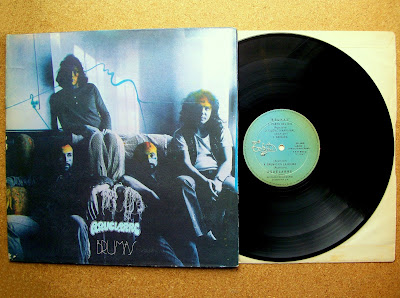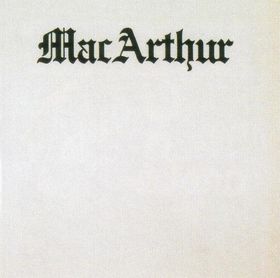Formed in 1971 from the aftermath of Almendra, their self titled debut was released in 1972, followed by Candiles (1973), Brumas (1974), and Siesta (1975). In 1975 they toured Spain, and returned to Argentina for their goodbye concert. They disbanded in 1977.
Friday, March 25, 2016
Tapiman - s/t 1971
Spanish blues-rock band that existed from 1971 to 1972, founded by Jose Maria Vilaseca (Tapi), and M. A. Nunez (Man). Pepe Fernandez was their first guitarist, replaced by Max Sunyer when he went into the military. The blues based rock album is a great specimen of early Spanish hard rock. The band only released three albums The Eponymous debut in 1971, and Rock and Roll Music in 1972, which consisted of all rock and roll covers. Another album, En Ruta was released in 1979.
Thursday, March 24, 2016
MacArthur - s/t A.K.A. "The Black Forest" 1974
There's some mixed info out there about this band. The youtube source (two of them) dates this album to 1973, another, discogs dates their first album (this one) to 1974, with their second "MacArthur 2" at 1982. Prog Archives puts the band forming in the mid-to late 70's, and states their albums "MacArthur 1 & 2" were pressed in quantities of 500 each, and sold only at live shows. Making the album highly sought after and heavily bootlegged. At least 1 re-issue is noted.
The band consisted of Ben MacArthur (vocals, guitar), Donald "Scott" Stockford (bass), and Jeff Bauer (drums).
One thing is for certain, the guitar work on this album is exceptional. Unbelievable at times. Word is the band reformed in 2006, with all original members, (with the exception of Chuck Harrington replacing Bauer on drums) and is joined by The Process vocalist David Asher on keyboards for live appearances. The band began recording old material as well as new, and Ben MacArthur's voice is as strong as it was 30 years ago.
https://myspace.com/macarthurv20
The band consisted of Ben MacArthur (vocals, guitar), Donald "Scott" Stockford (bass), and Jeff Bauer (drums).
One thing is for certain, the guitar work on this album is exceptional. Unbelievable at times. Word is the band reformed in 2006, with all original members, (with the exception of Chuck Harrington replacing Bauer on drums) and is joined by The Process vocalist David Asher on keyboards for live appearances. The band began recording old material as well as new, and Ben MacArthur's voice is as strong as it was 30 years ago.
https://myspace.com/macarthurv20
Thundermug - 1970-1976
Formed in London, Ontario, Canada, Thundermug existed from 1970 to 1976, and again from 1991 to 2001. The band was initially composed of Jo De Angelis (guitar and vocals), Bill Durst (keys and guitar), James Crorbitt (bass), and Ed Pranskus (drums). Their first Album: Thundermug Strikes (1972) resulted in a Canadian top 30 hit "Africa", which was based on radio interest in what was originally a non-single album song. The first single from the album had been a version of The Kinks "You Really Got Me." The was described by reviewer Ritchie Unterburger, as "...above average early 70's hard rock. It's a minor entry in the style, but a decent minor entry, moving along with real guts and convincing riffs, but not at the expense of fair melodies and well done vocal harmonies, and unusual progressions."
In 1973, the band recorded it's second album: Orbit , the title track was a Top 40 Canadian single. The album, was described (again, by Unterburger): "probably the best reflection of their straight-ahead, respectable-but-not-so-brilliant brand of early 70's hard rock, muscular but reasonably melodic, with inventive interplay between lead and backing vocals, ending with a rather inpressive facsimile of Hedrix's noisiest guitar wiggles."
Selections from the first two albums were released in 1973 in the U.S. by Epic, using the title of the first album Thundermug Strikes.
In 1974, the band recorded their third album: Ta-Daa releasing a cover if the Beatles "Drive My Car" as the first single. The album wasn't as successful as the previous two, and Joe De Angleis quit the band leaving it a trio. The band released one final single in 1975: "Clap Your Hands and Stomp Your Feet" which ended up a top 50 single in Canada.
The band din't formally break up, but became inactive in 1976.
In 1973, the band recorded it's second album: Orbit , the title track was a Top 40 Canadian single. The album, was described (again, by Unterburger): "probably the best reflection of their straight-ahead, respectable-but-not-so-brilliant brand of early 70's hard rock, muscular but reasonably melodic, with inventive interplay between lead and backing vocals, ending with a rather inpressive facsimile of Hedrix's noisiest guitar wiggles."
Selections from the first two albums were released in 1973 in the U.S. by Epic, using the title of the first album Thundermug Strikes.
In 1974, the band recorded their third album: Ta-Daa releasing a cover if the Beatles "Drive My Car" as the first single. The album wasn't as successful as the previous two, and Joe De Angleis quit the band leaving it a trio. The band released one final single in 1975: "Clap Your Hands and Stomp Your Feet" which ended up a top 50 single in Canada.
The band din't formally break up, but became inactive in 1976.
Monday, March 21, 2016
Silberbart - "4 Times Sound Raising" 1971
Silberbart was formed in Varel, Germany in the end of 1969 by Hajno Teschner on guitars and vocals, Peter Behrens on drums and percussion, and Werner Klug on bass. The band released only one record during their short existence. The album, Four Times Sound Raising from 1971 is one of the lost classics of Krautrock. An album that combines proto-heavy metal energy with free-form improvisation.
Teschner, who had connections at Phillips, was able to wrangle an album from the label. The trio recorded the album in April and May of 1971, and consisted of only four long tracks based on blues and heavy metal, but with a unique free-form structure and bizarre vocals on top. Unfortunately the strange, angst imbued record did not attract much attention at the time, and with poor sales, Phillips declined to keep the band on the label. The band kept going on through 1972 and then dissolved due to financial problems. Though Silberbart were barely known during their existence, by the end ofthe 70's they had appeared on the Nurse With Wound list of influences, as well as being described as one of the most original bands in Germany in Tibor Kneif's Ehinfurung in die Rockmusik (Introduction to Rock Music). Over the years, Silberbart's obscure L.P. has become legendary among collectors. It has never been released on CD except as a bootleg on Germonofon label.
Sunday, March 20, 2016
Josefus - "Dead Man" & "Josefus" 1970
From Houston, Texas, Josefus have been credited for being "one of the first models for the blunt sound of Texas hard rock an heavy metal." They were also featured in Classic Rock in an article titled: "The lost Pioneers of Heavy Metal."
Band members Dave Mitchell and Ray Turner originally played in a band in high school called Rip West. The two, along with Doug Tull would record a demo titled "I Love You." The group the changed their name to Josefus, when vocalist Pete Bailey joined the band. Phillip White, the band's second lead guitarist left the band in 1969.
Later they would go on to record an album Get Off My Case in Phoenix, Arizona during December 1969 with producer Jim Musil, The album was never released. This prompted the band to return to the studio with their own money and record Dead Man in March, 1970. The band soon garnered a huge live following, opening for acts like ZZ Top and Grand Funk Railroad. Unfortunately, Dead Man a heavy mix of Led Zeppelin style acid rock, with a definite Southern twist was destined to obscurity due largely to the fact that it wasn't released on a proper label (the band actually paid for the pressing themselves and released it on their own "Hookah" label.) That same year saw the release of their eponymous third album on Mainstream Records. They also recorded four singles on the Hookah label (Slave of Fear, Let Me Love You, Hard Luck, & Wheels) Josefus would perform their last show in Houston, Texas, at an auto show, though the group would reunite in the late 1970's.
In 1990, the band would reunite yet again with drummer Leesa Harrington-Squyres )after Doug Tull was found hanged in a jail cell in Austin, TX,) and record Son of Dead Man on Paradise Lost records. Josefus Webpage
Band members Dave Mitchell and Ray Turner originally played in a band in high school called Rip West. The two, along with Doug Tull would record a demo titled "I Love You." The group the changed their name to Josefus, when vocalist Pete Bailey joined the band. Phillip White, the band's second lead guitarist left the band in 1969.
Later they would go on to record an album Get Off My Case in Phoenix, Arizona during December 1969 with producer Jim Musil, The album was never released. This prompted the band to return to the studio with their own money and record Dead Man in March, 1970. The band soon garnered a huge live following, opening for acts like ZZ Top and Grand Funk Railroad. Unfortunately, Dead Man a heavy mix of Led Zeppelin style acid rock, with a definite Southern twist was destined to obscurity due largely to the fact that it wasn't released on a proper label (the band actually paid for the pressing themselves and released it on their own "Hookah" label.) That same year saw the release of their eponymous third album on Mainstream Records. They also recorded four singles on the Hookah label (Slave of Fear, Let Me Love You, Hard Luck, & Wheels) Josefus would perform their last show in Houston, Texas, at an auto show, though the group would reunite in the late 1970's.
In 1990, the band would reunite yet again with drummer Leesa Harrington-Squyres )after Doug Tull was found hanged in a jail cell in Austin, TX,) and record Son of Dead Man on Paradise Lost records. Josefus Webpage
Subscribe to:
Comments (Atom)































